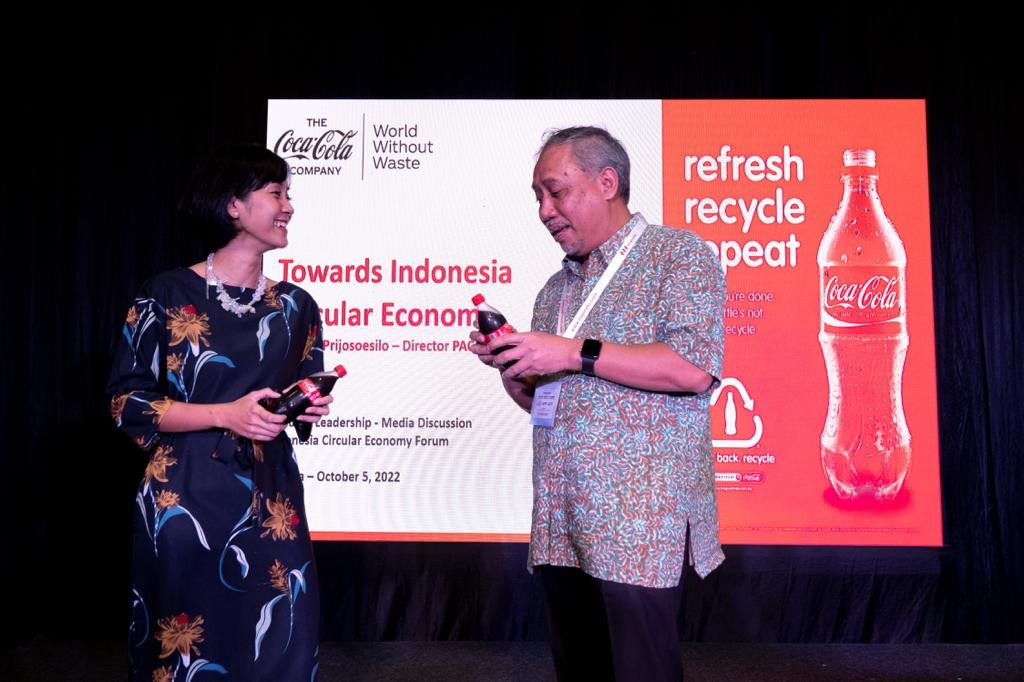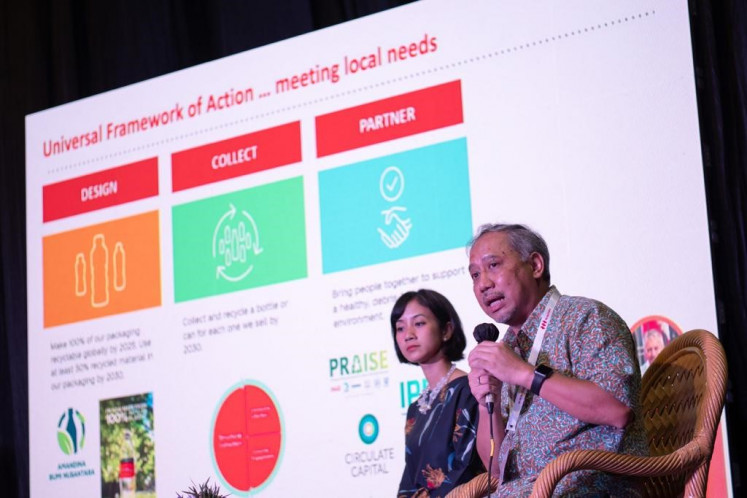Popular Reads
Top Results
Can't find what you're looking for?
View all search resultsPopular Reads
Top Results
Can't find what you're looking for?
View all search resultsHow Coca-Cola envisions a World Without Waste with circular economy
Indonesia’s current economy is highly based on a linear, take-make-waste approach. Raw (virgin) materials are collected, transformed into products that are then discarded after use.
Change text size
Gift Premium Articles
to Anyone
 Head of Corporate Communications for Indonesia and PNG Coca-Cola Europacific Partners, Ardhina Zaiza (left) and Director of Public Affairs, Communications and Sustainability PT Coca-Cola Indonesia, Triyono Prijosoesilo (right) in a media discussion with the topic, 'Commitment of The Coca-Cola Company and Coca-Cola Europacific Partners in Supporting the Circular Economy, Together Facing Plastic Waste Problems in Indonesia'
Head of Corporate Communications for Indonesia and PNG Coca-Cola Europacific Partners, Ardhina Zaiza (left) and Director of Public Affairs, Communications and Sustainability PT Coca-Cola Indonesia, Triyono Prijosoesilo (right) in a media discussion with the topic, 'Commitment of The Coca-Cola Company and Coca-Cola Europacific Partners in Supporting the Circular Economy, Together Facing Plastic Waste Problems in Indonesia'
I
ndonesia’s current economy is highly based on a linear, take-make-waste approach. Raw (virgin) materials are collected, transformed into products that are then discarded after use. Value is created in the system by producing and selling as many products as possible.
And what is beyond that ‘final’ waste line?
Indonesian cities and municipalities produce 105,000 tonnes of solid waste per day – with this figure expected to rise to 150,000 tonnes by 2025, according to World Bank projections. Among this are 4.9 million tonnes of plastic waste that remain uncollected, often disposed of in improperly managed landfills or open dumpsites.
The lack of waste collection services and direct access to disposal infrastructure, especially in rural communities, often leads to the use of waterways as a collective garbage disposal. Another World Bank report revealed that an estimated 345,500 tonnes of plastic waste per year found its way into the marine environment from land-based sources across Indonesia.
Disjointed waste collection and recycling efforts are not enough. The World Bank has further urged governments and stakeholders to transition from the linear economic model toward the more sustainable alternative, a circular economy.
In a circular economy, products and materials are designed to be used for as a long as possible, reintroducing recycled materials from end-of-life products back into the economy. It closes the loop between material extraction, manufacturing and disposal to reduce waste.
However, individual actors alone cannot achieve a circular economy at an expanded scale. Securing the financing and locally administering service provision efforts require collaborations between the government, private sector, civil society and NGOs. They often involve new partnerships between stakeholders on different steps of the value chain, sometimes with limited interaction.
An industry pioneer in circular economy
Environment and Forestry Ministerial Regulation No. 75/2019 obliges producers, which include brand owners and manufacturers, to implement their extended producer responsibility (EPR) in reducing the waste generated from their goods, packaging and services.
The policy contains three components that emphasize the phasing-out of single-use plastics and reusing and recycling of materials from goods and services. It also obliges companies to have a road map for waste reduction.
Coca-Cola has been a pioneer in leading knowledge, sharing technology and best practices dating back from the 1970s and into today. It was the first brand to introduce the first bottle from recycled plastic in 1991 and since then has established recycling and recovery systems in communities across the world.
In 2018, Coca-Cola launched an ambitious sustainable packaging initiative called World Without Waste. The program consists of three important pillars:
- Design: making its packaging 100 percent recyclable globally by 2025, and using at least 50 percent recycled material in its packaging by 2030. Also by 2030, Coca-Cola attempts to have at least 25 percent of its beverages sold in refillable/returnable packaging.
- Collect: reducing waste through its ambition to collect and recycle a bottle or can — regardless of its origins — for every one sold by 2030
- Partner: collaborating with partners and various stakeholders to support a healthy, debris-free environment and oceans.
Go far, go together
Head of Corporate Communications for Indonesia and PNG Coca-Cola Europacific Partners, Ardhina Zaiza (left) and Director of Public Affairs, Communications and Sustainability PT Coca-Cola Indonesia, Triyono Prijosoesilo (right) in a media discussion with the topic, 'Commitment of The Coca-Cola Company and Coca-Cola Europacific Partners in Supporting the Circular Economy, Together Facing Plastic Waste Problems in Indonesia'One of Coca-Cola’s strategies to close the loop in production is by improving the value of recycled plastics to lessen the dependence on plastic made from virgin materials. This would be done by investing in the supply chain.
But to incite an industry-scale transformation, Coca-Cola knows it needs to pave the way for other stakeholders to follow. Governments, like industries, are often as wary with the use of recycled plastic on the market, although the concerns may differ between countries.
In Thailand for example, the Ministry of Public Health only lifted a ban on the use of recycled materials for food containers in June. In addition, the ministry also set a quality standard for plastic food packaging.
“One of Coca-Cola’s goals is using 50 percent recycled material in our beverage containers. That means you need a supply of recycled content that is safe and is the right quality for food grade packaging,” said Sustainability and Partnership director, ASEAN and South Pacific, The Coca-Cola Company, Kirsten van Zandwijk.
“So when you look at the recycled plastic used across the containers that we make for our beverages, they’re really high standards in terms of [hygiene] and safety,” she added. “It’s crucial that we help create circular ecosystems where we get our containers back for recycling into new containers; so a plastic bottle can become a new one, over and over again. We can see that there’s an opportunity for us to use our leading position to demonstrate that it works and set an example for others to join us.”
Coca-Cola is a member of the multistakeholder framework called the Packaging and Recycling Association in Indonesia for a Sustainable Environment (PRAISE). Through its vast network, the company continuously focuses on working together with industry partners, NGOs and governments to open a wider access to recycled materials for packaging.
As part of the company’s commitment to enact the National Plastic Action Partnership (NPAP), Coca-Cola Europacific Partners and Dynapack Asia established a plant for recycling polyethylene terephthalate (PET) at the GIIC Cikarang industrial zone in Bekasi regency, West Java.
Based on the explanation from Lucia Karina, Public Affairs, Communications, and Sustainability director for Indonesia and Papua New Guinea Coca-Cola Europacific Partners, PT Amandina Nusantara has been operating since 2022 with capacity to recycle 25,000 tonnes of post-consumed PET Bottles.
“There are still many other materials we have to focus on, such as beverage cartons, batteries, paper, metal and glass. But if [we] really focus on what we can do together with the government, policymakers, the private sector and other shareholders, we can turn Indonesia into a circular economy success story,” said Public Affairs, Communications, and Sustainability director of PT Coca-Cola Indonesia, Triyono Prijosoesilo.
Coca-Cola is also one of the seven founders of the Indonesia Packaging Recovery Organization (IPRO). The NGO aims to match and coordinate with various stakeholders along the value chain including collecting and recycling. IPRO aims to ensure that local, smaller businesses are included as part of the initiative.
“Initially, IPRO only had six companies in its membership. Now, however, there are more than nine. We are hopeful that IPRO can expand its membership and provide options for the local and smaller players to participate by collecting and recycling their own material,” added Triyono.
“Small companies may not be able to [act] on their own. Only by doing it together can we [make a difference],” he continued.
IPRO is currently in partnership with waste banks and PET collaborations in Bali and East Java and supporting the construction of a material recovery center in Balangan, Madura. It is also extending its collaborations with the recycling of beverage cartons, such as tetra packs.
Collection centers are not the only backbone of waste recycling in Indonesia. Pemulung (informal waste collectors) are an integral but often overlooked part of the system. With no well-established policies on waste management, they are often left without support or improvement on their quality of living.
“These [pemulung] earn a living from collecting PET, which we consider as gold among plastics due to its high value. Their involvement is especially relevant in rural areas or remote islands where there is no well-established waste infrastructure in place yet.” Kirsten explained.
“As the formal sector in the value chain, we carry a huge responsibility to focus on human rights and economic empowerment,” she added. “We need to work closely together with community partners to achieve them.”
Beyond companies, Coca-Cola attempts to embrace and empower Indonesia’s pemulung as an integral part of Indonesia’s waste management. The Mahija Parahita Nusantara Foundation was founded to alleviate the difficulties of the pemulung community in the social, educational and environmental fields to improve their quality of life.
Creating a ripple effect
Just like policymakers and the companies themselves, customers too are an integral part in realizing a circular economy. The challenge, however, lies in educating the public in the relatively new field.
The brand’s campaigns revolve around incentivizing customers to start segregating their waste, collecting the bottles and eventually sending them to waste banks or other recyclers. At the current stage, Coca-Cola is focusing around awareness and habit building.
Concerns about customer acceptance, however, still remain. Compared with virgin materials, packaging containing recycled content is more costly and requires an informed strategy to ensure it does not impact affordability and consumer acceptance.
“When we first embarked on this journey, we didn’t think about pricing and consumer acceptance but the right thing to do for our environment. But we also need to figure out how this transition into [circular economy] can be more accepted by our customers,” Triyono concluded.










